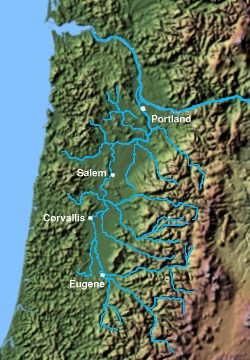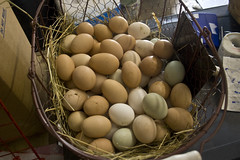 Image via Wikipedia
Image via WikipediaAfter a swim and picnic by the river, and after picking up more trash than we made (apparently other swimmers had been a little less conscientious), we packed up and headed back to our friends' place to visit with their chickens. Hens which are raised and socialized by people are very friendly, and love to be held and pet. They make sounds kind of like purring cats when you scratch their neck. They also, as you may have heard, lay eggs.
When you see eggs from chickens on a small farm or from a home garden it suddenly becomes very odd that eggs in the grocery store are all white or uniformly brown, and all exactly the same size. This is most unnatural. Our hosts in Oakridge provided us with a dozen eggs, most of which were either brown or speckled brown, and one of which was green. No two eggs were the same size or color.
 |
2/3 of a dozen fresh eggs (the four missing were used in today's breakfast) |
White hens lay white eggs, brown hens lay brown eggs, and green hens... you get the idea, I think. The point is that the eggs resemble their hens, and a dozen eggs that are all identical speaks to our drive to master nature, make it uniformly productive and predictable. Several shelves of cartons and flats of eggs from several different 'farms' that are identical speaks volumes, and is a pretty good picture of what industrial agriculture is all about.
Fresh, organic eggs taste quite different as well. I don't really know how to describe it except to say that they taste 'cleaner.' The best way to experience this difference in flavor is to poach the eggs, and serve simply with a dash of salt and pepper with (or on top of) buttered toast. Poaching has the least influence on the flavor of the eggs, and is the easiest way to get perfectly cooked whites with completely soft yolks. It can be a little stressful if you have never done it before, but the results are well worth it.
Eggs should be poached in just barely boiling water which has been slightly acidified with a bit of plain white vinegar. The Cooks Book (my kitchen bible) recommends cracking the eggs onto a saucer one at a time and gently sliding them into the water, to minimize the splashing effect. Then, using a slotted spoon, gently roll the white over the yolk until it is enveloped. Repeat with the next egg, up to about 4 at a time. Cook them for 2 minutes or so, and then plunge them into a simmering pan of salted water to remove the vinegar and season a little. Set on a dish towel to drain for a few seconds and serve immediately. With fresh eggs, very little seasoning is required, and Hollandaise sauce is kind of overkill (though delicious overkill...).
(my kitchen bible) recommends cracking the eggs onto a saucer one at a time and gently sliding them into the water, to minimize the splashing effect. Then, using a slotted spoon, gently roll the white over the yolk until it is enveloped. Repeat with the next egg, up to about 4 at a time. Cook them for 2 minutes or so, and then plunge them into a simmering pan of salted water to remove the vinegar and season a little. Set on a dish towel to drain for a few seconds and serve immediately. With fresh eggs, very little seasoning is required, and Hollandaise sauce is kind of overkill (though delicious overkill...).
Unfortunately, fresh organic eggs are pretty expensive, so we are very lucky to have friends producing their own. Still, for a special occasion, perhaps to impress your significant other on valentines day, fresh eggs are a relatively inexpensive and effective splurge. You can find them at most Farmer's Markets.
Eggs should be poached in just barely boiling water which has been slightly acidified with a bit of plain white vinegar. The Cooks Book
Unfortunately, fresh organic eggs are pretty expensive, so we are very lucky to have friends producing their own. Still, for a special occasion, perhaps to impress your significant other on valentines day, fresh eggs are a relatively inexpensive and effective splurge. You can find them at most Farmer's Markets.
 Image by woodleywonderworks via Flickr
Image by woodleywonderworks via Flickr
Eating those eggs has reconfirmed that I would love to have some city chickens, if we ever have a bit of space for them! You can find tons of info about keeping chickens in the city, including laws and ordinances (most cities do allow a certain number of chickens per household) at http://urbanchickens.org/
ReplyDelete